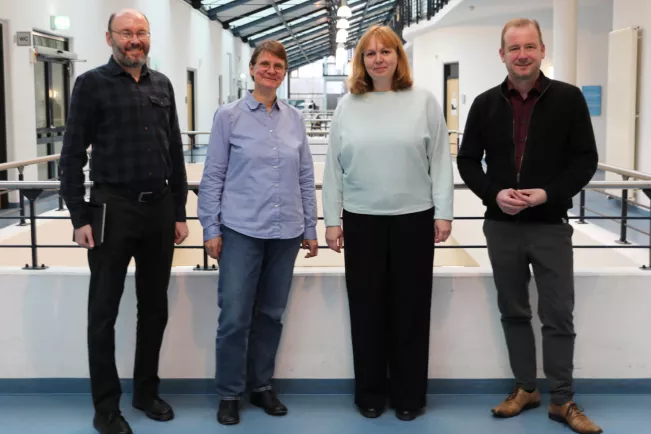Department of Computer Science
Researcher from Ukraine visits the H-BRS
When the contact restriction measures were lifted in the wake of the coronavirus pandemic, you could almost feel the relief among the German population at finally being able to return to normality. Maintaining social contacts, meeting each other and being face to face is hugely important for many people.
For Mariia Dorosh, her colleagues and students at the Polytechnic National University in Chernihiv, this normality does not exist. Almost two years after Russia's invasion of Ukraine in violation of international law, the majority of courses are still taking place online: "Last September, we actually wanted to return to face-to-face teaching. But then there was a missile attack on our city centre in August and we postponed our return to the campus," explains the academic. Although it is possible to work at the university in principle, there is always the risk of an attack.

A taste of normality
The university city of Chernihiv is located in the north of Ukraine, near the borders with Belarus and Russia. The city was attacked at the beginning of the Russian invasion. Many buildings were destroyed and hundreds of civilians lost their lives. The university was also badly damaged in these attacks: "Our windows were broken and the heating system was broken, we couldn't return to the campus," recalls Dorosh.
As the Ukrainian army has managed to repel the ground offensive, there are currently no ground battles in the city area. Although there is always a risk of an air strike, the university buildings have been largely repaired - also with the help of H-BRS.
The exchange programme enabled Mariia Dorosh to pursue one of her passions again: "I love doing research. Unfortunately, I don't have much time to do this at home alongside my teaching and everyday life. It's great that I was able to spend a month here working solely on our project," says Dorosh. Together with Petra Haferkorn, she looked at the question of how improved internal communication can help to make information security in companies and organisations more effective. "Around 60 to 90 per cent of hacker attacks are so-called social engineering attacks. This means that employees are manipulated so that attackers can get into the system. An improved communication culture can ensure greater data security here," says Professor Petra Haferkorn.
"It is important that you are not indifferent to us"
In addition to the professional exchange, the visit to Germany was also personally meaningful for the Ukrainian researcher: "Russian propaganda is trying very hard to convey to us in Ukraine that nobody is interested in our fate anymore. I was touched to see that people here want information about our situation and are genuinely interested in what is happening to us. It is very important for us, for the Ukrainian people, to see that the rest of the world cares about us," says Dorosh.
There has been a regular exchange between H-BRS and its Ukrainian partner university since 2012, which is funded by the Eastern Partnerships programme of the German Academic Exchange Service (DAAD). Every year, four to five students, doctoral students, academic staff or professors travel to the partner university, with Ukrainian guests usually visiting H-BRS.
So far, the cooperation has been limited to research projects at the Department of Engineering and Communication (IWK). This is where Professor Roustiam Chakirov, who initiated the exchange programme and has been organising it for twelve years, works: "Ukrainian researchers have greatly enriched our work in recent years. We have already produced numerous joint articles and conference papers. It's great that the exchange is now being continued beyond the department," says Chakirov.
In addition to research, Mariia Dorosh and Petra Haferkorn have also worked very well on a personal level. For both, a renewed collaboration in the future is also conceivable, possibly again in the presence of Sankt Augustin.
Kontakt

Petra Haferkorn
Professor of Computer Science, in particular IT-Security Management
Research fields
Location
Sankt Augustin
Room
C 277
Address
Grantham-Allee 20
53757 Sankt Augustin
Telephone
+49 2241 865 9867
Tuesday until Friday
Location
Sankt Augustin
Room
E 241
Address
Grantham-Allee 20
53757, Sankt Augustin
Telephone
+49 2241 865 9969